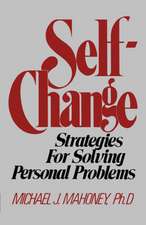Values and Behavior: Taking a Cross Cultural Perspective
Editat de Sonia Roccas, Lilach Sagiven Limba Engleză Hardback – 28 aug 2017
Personal values are cognitive representations of abstract, desirable motivational goals that guide the way individuals select actions, evaluate people and events, and explain their actions and evaluations. The unique features of values have implications for their impact on behavior. People are highly satisfied with their values and perceive them as close to their ideal selves. At the same time, however, daily interpersonal interaction reveals that individuals hold different, sometimes opposing, value profiles. These individual differences are even more apparent when individuals from different cultures interact.
The collected chapters address the links between values and behavior from a cultural perspective. They review studies conducted in various cultures and discuss culture as a moderator of the relationships between values and behavior. Structurally, part I of the volume discusses what values are and how they should be measure; part II then examines the contents of the relationships between values and behavior in different life-domains, including prosocial behavior, aggression, behavior in organizations and relationships formation. Part III explores some of the moderating mechanisms that relate values to behavior. Taken together, these chapters review and synthesize over twenty years of research on values and behavior, and propose new insights that have important implications for both research and for practice.
| Toate formatele și edițiile | Preț | Express |
|---|---|---|
| Paperback (1) | 887.53 lei 38-45 zile | |
| Springer International Publishing – 3 aug 2018 | 887.53 lei 38-45 zile | |
| Hardback (1) | 1276.57 lei 6-8 săpt. | |
| Springer International Publishing – 28 aug 2017 | 1276.57 lei 6-8 săpt. |
Preț: 1276.57 lei
Preț vechi: 1556.79 lei
-18% Nou
Puncte Express: 1915
Preț estimativ în valută:
244.28€ • 261.21$ • 203.67£
244.28€ • 261.21$ • 203.67£
Carte tipărită la comandă
Livrare economică 18 aprilie-02 mai
Preluare comenzi: 021 569.72.76
Specificații
ISBN-13: 9783319563503
ISBN-10: 3319563505
Pagini: 255
Ilustrații: X, 255 p. 20 illus., 6 illus. in color.
Dimensiuni: 155 x 235 mm
Greutate: 5.27 kg
Ediția:1st ed. 2017
Editura: Springer International Publishing
Colecția Springer
Locul publicării:Cham, Switzerland
ISBN-10: 3319563505
Pagini: 255
Ilustrații: X, 255 p. 20 illus., 6 illus. in color.
Dimensiuni: 155 x 235 mm
Greutate: 5.27 kg
Ediția:1st ed. 2017
Editura: Springer International Publishing
Colecția Springer
Locul publicării:Cham, Switzerland
Cuprins
Part I What Are Values and How Should They Be Measured?
1. What personal values are and what they are not: Taking a cross-cultural perspective by Lilach Sagiv and Sonia Roccas
2. Methodological issues in studying personal values by Sonia Roccas, Lilach Sagiv and Mayan Navon
3. The refined theory of basic values by Shalom H. SchwartzPart II Part II: Values and Behavior in Contexts
4. Many kinds of kindness: The relationship between values and prosocial behavior by Bec Sanderson and Jamie McQuilkin
5. The relations between values and aggression: A developmental perspective by Maya Benish-Weisman, Ella Daniel, Ariel Knafo-Noam
6. Values and behavior in the work environment: Taking a multi-level perspective by Sharon Arieli and Orly Tenne-Gazit
7. Cultural values and relationship development in organizations by Elizabeth C. Ravlin and Patrick J. Flynn
Part III Part III: Relating Values and Behavior
8. Value instantiations: The missing link between values and behavior by Paul H. P. Hanel, Katia C. Vione, Ulrike Hahn, and Gregory R. Maio
9. Values and affective well-being: How culture and environmental threat influence their association by Diana Boer
10. From values to behavior and from behavior to values by Ronald Fischer 11. Conclusion by Jan Cieciuch
Notă biografică
Sonia Roccas is a Professor at the Open University of Israel. She received her Ph.D. in Social Psychology from the Hebrew University of Jerusalem and was a post doctoral fellow at Ohio State University. She spent Sabbatical years at the University of Pennsylvania (2001) and at the University of Kent (2008). She served as Dean of Academic Studies, at The Open University of Israel (2009-2012), and as the founding director of the MA program in Social Psychology (2012-2016). She also served as Associate Editor at the European Journal of Social Psychology and is currently serving as Associate Editor at the Personality as Social Psychology Bulletin. Her research focuses on psychological processes as they relate to social identities and to value priorities. In both fields she investigates the interplay between personal, situational, and cultural factors. Her work has been published in leading journals such as the Journal of Personality and Social Psychology, Psychological Science, Journal of Personality, Personality and Social Psychology Bulletin, and Personality and Social Psychology Review.
Lilach Sagiv is a Professor at the School of Business Administration, at the Hebrew University of Jerusalem. She received her Ph.D. from the Hebrew University of Jerusalem. She then spent a post-doctoral year at the Psychology Department at the University of Michigan, where she also spent sabbaticals as a visiting professor in 2005 and 2011. She served as an Associate Dean for Teaching at the School of Business Administration of the Hebrew University (2008-2010; 2013-2016) and is currently the Chair of the University Appointment and Tenure Committee in the Non-Experimental Sciences. She also serves as an associate editor at the European Journal of Social Psychology (2015-2017) and is serving (since 2011) on the editorial board of the Journal of International Business Studies. Her research interests focus on the impact of personal, professional and cultural level values on organizations and their members. She is investigating the mechanisms that link values to behavior and the nature of identification with groups and organizations, and is a member of the "question of identity" research group at the Scholion-Mandel interdisciplinary center at the Hebrew University. Her work has been published in leading journals such as the Journal of Personality and Social Psychology, Psychological Science, Journal of Personality, Strategic Management Journal, and Personality and Social Psychology Review.
Lilach Sagiv is a Professor at the School of Business Administration, at the Hebrew University of Jerusalem. She received her Ph.D. from the Hebrew University of Jerusalem. She then spent a post-doctoral year at the Psychology Department at the University of Michigan, where she also spent sabbaticals as a visiting professor in 2005 and 2011. She served as an Associate Dean for Teaching at the School of Business Administration of the Hebrew University (2008-2010; 2013-2016) and is currently the Chair of the University Appointment and Tenure Committee in the Non-Experimental Sciences. She also serves as an associate editor at the European Journal of Social Psychology (2015-2017) and is serving (since 2011) on the editorial board of the Journal of International Business Studies. Her research interests focus on the impact of personal, professional and cultural level values on organizations and their members. She is investigating the mechanisms that link values to behavior and the nature of identification with groups and organizations, and is a member of the "question of identity" research group at the Scholion-Mandel interdisciplinary center at the Hebrew University. Her work has been published in leading journals such as the Journal of Personality and Social Psychology, Psychological Science, Journal of Personality, Strategic Management Journal, and Personality and Social Psychology Review.
Textul de pe ultima copertă
What are values? How are they different from attitudes, traits, and specific goals? How do our values influence our behavior, and vice versa? How does our culture and environment impact the relationship between values and behavior? These questions and more are rigorously examined by prominent and emerging scholars in this significant volume Values and Behavior: Taking A Cross Cultural Perspective.
Personal values are cognitive representations of abstract, desirable motivational goals that guide the way individuals select actions, evaluate people and events, and explain their actions and evaluations. The unique features of values have implications for their impact on behavior. People are highly satisfied with their values and perceive them as close to their ideal selves. At the same time, however, daily interpersonal interaction reveals that individuals hold different, sometimes opposing, value profiles. These individual differences are even more apparent when individuals from different cultures interact.
The collected chapters address the links between values and behavior from a cultural perspective. They review studies conducted in various cultures and discuss culture as a moderator of the relationships between values and behavior. Structurally, part I of the volume discusses what values are and how they should be measure; part II then examines the contents of the relationships between values and behavior in different life-domains, including prosocial behavior, aggression, behavior in organizations and relationships formation. Part III explores some of the moderating mechanisms that relate values to behavior. Taken together, these chapters review and synthesize over twenty years of research on values and behavior, and propose new insights that have important implications for both research and for practice.
Personal values are cognitive representations of abstract, desirable motivational goals that guide the way individuals select actions, evaluate people and events, and explain their actions and evaluations. The unique features of values have implications for their impact on behavior. People are highly satisfied with their values and perceive them as close to their ideal selves. At the same time, however, daily interpersonal interaction reveals that individuals hold different, sometimes opposing, value profiles. These individual differences are even more apparent when individuals from different cultures interact.
The collected chapters address the links between values and behavior from a cultural perspective. They review studies conducted in various cultures and discuss culture as a moderator of the relationships between values and behavior. Structurally, part I of the volume discusses what values are and how they should be measure; part II then examines the contents of the relationships between values and behavior in different life-domains, including prosocial behavior, aggression, behavior in organizations and relationships formation. Part III explores some of the moderating mechanisms that relate values to behavior. Taken together, these chapters review and synthesize over twenty years of research on values and behavior, and propose new insights that have important implications for both research and for practice.
Caracteristici
Presents the state of current research on the relationships between values and behavior across cultures
Contains three parts, discussing (a) what values are, (b) the content of the relationships between values and behavior and (c) the mechanisms that relate values to behavior
Includes chapters from the leading researchers in the field of values
Includes supplementary material: sn.pub/extras
Contains three parts, discussing (a) what values are, (b) the content of the relationships between values and behavior and (c) the mechanisms that relate values to behavior
Includes chapters from the leading researchers in the field of values
Includes supplementary material: sn.pub/extras




























